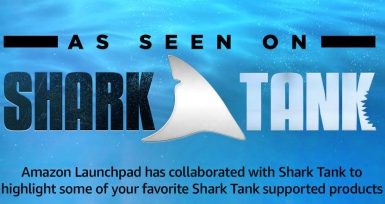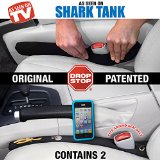 Beyond the Tank episode 105 aired Tuesday, May 3, 2016. Three businesses from past seasons of Shark Tank get in-depth updates on their progress since their initial appearance. Beyond the Tank episode 105 features Bon Affair, the wine spritzer business Mark invested in during season five and entrepreneur Jayla Siciliano shows how challenging – and profitable – the business became since he got on board. Nathan Holzapfel scored a deal with Daymond for Mission Belt back in season four and we get a glimpse of what’s happened since. Tigere “Tiggs” Chiriga didn’t get a deal for his Floating Mug in season six, but we see what happens when he approaches Lori six months later.
Beyond the Tank episode 105 aired Tuesday, May 3, 2016. Three businesses from past seasons of Shark Tank get in-depth updates on their progress since their initial appearance. Beyond the Tank episode 105 features Bon Affair, the wine spritzer business Mark invested in during season five and entrepreneur Jayla Siciliano shows how challenging – and profitable – the business became since he got on board. Nathan Holzapfel scored a deal with Daymond for Mission Belt back in season four and we get a glimpse of what’s happened since. Tigere “Tiggs” Chiriga didn’t get a deal for his Floating Mug in season six, but we see what happens when he approaches Lori six months later.
Each Episode of Beyond the Tank has these “back stories” and Shark Tank updates. We’ll recap them here.
Beyond the Tank Episode 105 Featured Sharks
- Investor – Lori Grenier
- Investor – Daymond John
- Investor – Mark Cuban
Beyond the Tank Episode 105 Entrepreneurs
- Company – Bon Affair
- Company – Floating Mug
- Company – Mission Belt
Beyond the Tank Episode 105 Recap
Bon Affair
Jayla Siciliano came to the Shark Tank during season 5, to present her company, Bon Affair. Mark Cuban made her an offer of $150,000 in return for 35% of her company.
“What I saw, when Jayla came on the show, was, she’s passionate, she’s got a great product. She’s a grinder. She’s not a ‘wantrepreneur.’ She’s definitely an entrepreneur.
Prior to Shark Tank, Bon Affair had only done $11,000 in sales. Since the appearance, sales have grown to $500,000, which is an approximate 500% increase. Even with the sales, profits are still being plowed back into the company. Investors have put $900,000 total into Bon Affair, and Jayla is worried about how to repay the investments and bring the company into the black.
Mark had recommended adding a container to the line that would be appropriate for poolside, so Jayla has added an aluminum container to her lineup. She’s talking to a major winery that has over 200 distributors in the US. If she enters into an equity agreement, it would reduce the percentage of the value of the shares of other shareholders. She’s unsure of how Mark will feel about the deal.
“The challenge,” she says, “Is, we’re not profitable yet this year, but what would be extremely beneficial would be having a little bit more leverage with those distributors.” She presents the potential deal to Mark, explaining that the distributor she’s talking to is offering their network and relationships.
Mark is on board with giving the distributor equity, but he wants to limit the deal, and put a sales requirement on the deal, to make them earn their share of the company. Mark reassures Jayla. “Why do you think people invested in you?” He asks, pointing out that she’s “shown nothing but progress.”
Hearing Mark’s encouragement gives Jayla confidence. He understands how difficult it is to keep moving forward in a new business. “It’s hard for an entrepreneur to keep on grinding sometimes because, it can get hard when you’re not always making progress, when you feel like you’ve taken a step backwards. There’s no question that Jayla’s passion is a big part of who she is and what’s going to make her an overnight success. I’m excited to see what happens.”
The meeting with the distributor goes well. Jayla tours the winery and discovers that they have the capacity to easily produce the amounts she’ll need. She brings up the idea of the deal being based on achievement, and the distributor owners are on board. They prefer achievement based deals and having goals to reach. Jayla and the distributors shake hands on the deal.
“I see this as being bigger,” says Jayla, “Thank a wine spritzer. It’s just so exciting, and it just goes to show, you never know what’s around the corner.”
The Mission Belt
Nathan Holzapfel came to the Shark Tank in season four with his company, The Mission Belt. He made a deal with Daymond John for $50,000 in return for 37.5% of his company. The Sharks were impressed with his drive. Upon his arrival for the taping, he signed into the hotel, and went out door to door, selling 20 belts before his appearance.
“Nate,” says Daymond, “Is the most amazing sales person ever, and it’s always about sales.”
In the 3 ½ weeks following his appearance on Shark Tank, Mission Belt did over $1 million in sales. Now, Mission Belt is in over 1,000 retail locations. Growth is at 400% a year, and they are employing 45 people. Nate hopes to take Mission Belts to a national market and make the company a household name. He’s meeting with Daymond, to discuss the future of the company.
Daymond is concerned about the ability to sell in “big box” retail stores. “The biggest challenge we have with Mission Belts,” he says, “is, when you walk in the store, it doesn’t sell itself, and if it doesn’t sell when it’s in the stores, then the stores are not only gonna not reorder them again, they’re gonna actually send them back.”
Nate understands the risks, but he’s determined to take Mission Belts to the next level. He’s excited and anxious to talk to Daymond about the next steps to grow the company. Growth has been happening so fast, they’re disorganized and overwhelmed.
Daymond is concerned. With distribution so haphazardly organized, he just can’t see how they “can go from 1,000 to 2,000, let alone 20,000 stores.”
He still believes in the company, and in Nate’s mission. A percentage of every sale goes toward helping families become financially independent.
“I firmly believe that you are only successful,” says Daymond, “if you do what you live and you give back, and if you only do it for money, you’re going to end up in the wrong place, and that’s why I find Nate’s mission valuable and Nate valuable.”
Nate takes John to meet his family and see his home. Daymond’s impressed with the beautiful home, and excited to meet the family behind Mission Belts. He’s also a little taken aback by Nate’s seemingly extravagant lifestyle.
“Nate’s enjoying his success right now,” says Daymond, “But he can’t get comfortable. He cannot take his eye off the business, ‘cause this will all go away like that.”
Back at the office, the pair get down to business. Nate’s anxious to get Mission Belts into the wider retail market. He’s hungry for growth, and feels he needs to make bold, decisive moves to accomplish his goals.
“You are one of the best salespeople I’ve ever met in my life,” says Daymond, getting down to the nitty gritty. “But it doesn’t seem like your sales are being used anymore, ‘cause it seems like you are now running and working in the business instead of on the business.”
“This is what I was worried about,” explains Daymond. “The business is growing so fast. He’s trying to do everything. But Nate needs to prioritize. He needs to use his time wisely.”
Daymond recommends creating a sales force, building ambassadors to go out and make the sales. He points out that being in big-box stores means taking a big risk with the company. They could make or break Mission Belts, depending on how sales go in the marketplace. Nate is visibly stressed as they discuss the possibilities.
“Nate’s under a lot of pressure,” says Daymond, “And this whole idea and goal, to go to 20,000 stores, it may be too much. I’m thinking he’s in way over his head.”
Nate recognizes the truth of what Daymond’s telling him. He considers scaling back his immediate goals to 5,000 stores rather than 20,000, focusing on the smaller retail outlets while he begins building his sales force in preparation for more expansive growth.
“Right now I’m realizing, it’s about baby steps,” says Nate. “The [sales training at the] board of Provo isn’t going to make or break Mission Belts, but it’s one of the baby steps I need to take to get to the big picture.
Daymond is on board with Nate’s new focus. “Nate needs to concentrate on selling. He needs to do that in every single store, around the country. That’s the only way to keep Mission Belt moving forward.”
“You certainly can’t get comfortable,” agrees Nate. “Living the American dream doesn’t mean getting there and then stopping. It means continually pushing, continually moving forward.”
The Floating Mug
Tigere “Tiggs” Chiriga came from Zimbabwe as a young man. He earned a scholarship and an MBA. He came to season 6 of Shark Tank with The Floating Mug. Sales in the first year were $105,000. While the Sharks were impressed with his initial sales, they felt the retail price of $29.99 was too high. One by one they went out, until only Lori Greiner remained. She liked the coaster-less drinking glass, calling it the “hero” of Tigg’s line, but she didn’t feel he was ready. He left the Tank with no Shark deal.
Without a Shark deal, he wasn’t able to go into production and take advantage of the demand created by the Shark Tank effect. He’s taken what investments he was able to raise, and developed a working prototype of the coasterless drinking glass.
“We need an infusion of capital,” explains Tiggs. “And without it, I just can’t justify going forward.”
Six months after Shark Tank, Tiggs e-mailed Lori. She invited him to come visit her in Chicago for a meeting. He brings his prototype, and sets out to get some Shark advice.
“I really like Tiggs,” says Lori. “And I want to support him. I get e-mails from entrepreneurs all the time. I can’t help everybody, but he’s the kind of guy I’d like to give advice to.”
Tiggs presents his prototypes to Lori. She’s impressed with his progress, and that he’s got international patents pending. They discuss the deal he was seeking in the Tank; $75,000 in return for 15%. Although Tiggs had $15,000 worth of preorders from the night Shark Tank aired, he was unable to take advantage of the opportunities because of limitations on production due to a lack of capital.
“I think that this can happen,” says Lori, holding up the coasterless glass. “I think that this is doable, but you need a very strategic partner that can come in and do the heavy work. Without it, I honestly don’t see you getting there.”
She makes him an offer. $75,000, in return for 51%. Tiggs considers the offer, but he’s unwilling to give up control of his company. Partnering with Lori could mean the turning point for Floating Mug.
“This is a crucial point for my business,” says Tiggs. “I have to make a decision, whether to give up control of my company.”
It’s not an easy choice, but Tiggs recognizes his inability to continue on his own. He accepts the deal. Floating Mug is about to take off.
“I think we can turn this into a global brand,” says Lori.
“Getting a second chance with Lori is validation of all the time and effort, sweat, tears that I’ve poured into this business,” says Tiggs. “I believe truly that we could grow this business into something that’s sustaining myself and my family and maybe even my children and their children. This really is a dream come true.”







Recent Comments